A Minister has outlined why Royal Navy warships must, by virtue of national security, be built in the United Kingdom.
The information came to light after a written question was submitted in Parliament.
Jeremy Quin, Minister of State for the Ministry of Defence, recently said in response to a written question.
“For national security reasons, the UK needs to maintain a shipbuilding enterprise with the industrial capabilities to design, manufacture, integrate, modify and support current and future naval ships (both Royal Navy and Royal Fleet Auxiliary).
Overall, the MOD considers that a regular drumbeat of design and manufacturing work in UK yards is needed to maintain the industrial capabilities important for UK national security and to drive efficiencies which will reduce longer-term costs in the shipbuilding portfolio.”
Other than procurement activity undertaken during the World Wars, the UK has not had a complex warship built outside of the UK since the start of the 20th century at least.
All of the Royal Navy’s new complex warships are being built in UK shipyards and the UK Government says it remains committed to utilising the strengths of UK industry in this specialist and complex area.
There’s also the matter of contracts using US technology, defence contractors that work with items or technology of US origin are also covered by undertakings given in accordance with the US International Traffic in Arms Regulations (ITAR), under which any change to an existing US export licence requires US State Department approval.
Simply put, the UK wants to retain the ability to build its own warships and to keep sensitive technology somewhat secret, that’s it.


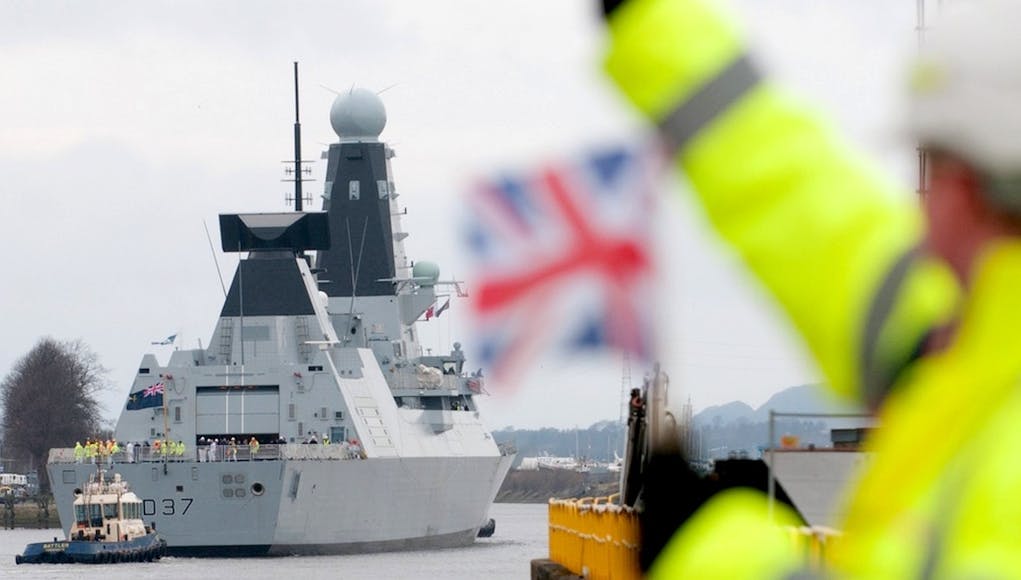
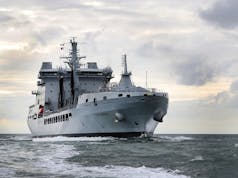
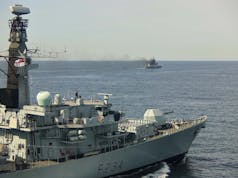
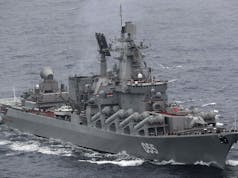
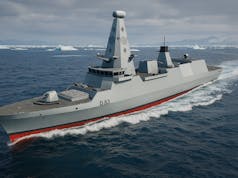

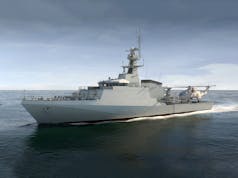

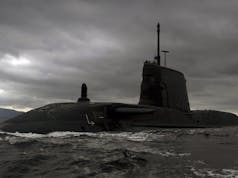
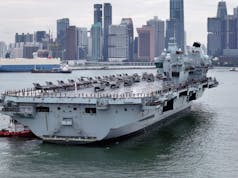
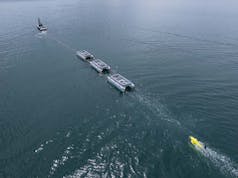

But prior to the 20th Century the Royal Navy had the very pragmatic industrial strategy of letting the French build many of it’s warships.
Yep, but they were somewhat tardy with the delivery schedule. As such the Royal Navy had to go and fetch them.
By capturing French ships, and bringing into RN service.
HMS Enterprise (both ship and name) entered the Royal Navy in this fashion and look where that name ended up in modern cultural history, if one is familiar with the Enterprise series opening sequence… though one has to add it sort of hints at how The 1775 ship of that name in similar fashion actually ended up in US service. Swings and roundabouts I guess.
And sometimes even supplying the crew!
Yes the French were very cooperative. Also in 1807 the Danish were kind enough to donate vessels to the RN in bulk. Perhaps a missed opportunity for finding type 31 ship names.
The Mistrals are quite nice…. maybe we can nab those…
Nah…. Go for the new Barracuda SSN……
Clever……. 😊
Outside non defense related reasons (policitcs of putting Jobs into Scotland) and historic reasons that no longer apply in the modern world, I would like to know a single real reason for it.
Keeping defense tech local is clearly rubbish, as pretty much everything on our ships is build or designed by companies that are foreign owned and we tender them out globally.
To me defense spending should come down to one simple question, of how can we get the best capability, within the budget constraints, to ensure we protect our interests globally and our service men. Nothing else should matter.
When Covid kick off last year the Government discovered that just in time procurement of PPE from overseas broke down. Globalisation – going for the lowest cost supplier bit us in the arse. The UK had a critical need to procure PPE, and we could not import it. This meant a quick scramble to get UK based production online.
The UK needs to decided through an industrial strategy which industries are critical to our countries health, wellbeing and security. I would hope going forward the NHS has a policy of local procurement – this makes sense to secure your supply chains.
Also do we want to be dependant on certain countries who do not believe in western democratic values & freedoms?
The same argument holds true for defence procurement. We need to maintain a local capacity. How much of a capacity is the question.
Exactly what’s the point of projecting UK PLC globally and protecting our ‘interests globally’ if in reality we are simply doing so for entirely foreign produced assets and interests with us simply being a market place for them to sell into. As you say in a crisis that nearly always breaks down and becomes extremely costly to maintain at best. Very short sighted, especially when despite much foreign ownership the Defence Industry in this Country, be it called Bae, MBDA, Leonardo or Thales is one of the few leading areas of technology we still punch above our weight in. It’s also very much more complex than the simple headline, in that a lot of very crucial US military businesses are for example Bae owned, or other foreign owned, even Boston Dynamics indeed is, but they are still very much American companies. One must also remember just how British a company like for example Siemens UK has become since it was set up well over a Century ago by the company founder’s Brother a man who became a British citizen and knighted for his efforts and until re entry run by a very impressive Brit of Austrian birth.
As an aside Hancock just stated that 77% of PPE is now produced in this Country a lesson well learned from experience one hopes.
The issue is where do the parts come from. Its all well and good being able to put the parts together in the UK, but if we can’t get the parts there is an issue.
But that issue goes way further, for example the basic topic of the food chain, we do not produce enough food domestically to feed the nation and so we have to rely on allies and rely on the assumption that in the event of a major war that they do not close their borders and keep the food for their domestic market.
Reality is the world is just too interconnected now.
In this case i am trying to split the economic and military argument. I don’t think there is any doubt that from an economic point of view it is better for uk tax payers money to be spent on UK built stuff and create uk based jobs.
But if we take this to extreme the cheapest and most capable of building our ships is China (where we sent the rest of our industry and killed our domestic production/jobs). How is that going to work out when we are now Challenging China in certain scenarios? They will just withhold our ships and then good luck U.K. is now a vassal state of China. Or in a best scenario once our industry is dead then they put up prices that we have to pay. Defence strategy and industrial strategy should go hand in hand and we should not have feast and famine as then we never have the chance to create efficiently and learn from screw ups.
“Reality is the world is just too interconnected now.”
I’m not sure its “too” interconnected, the more connected the world is the better. If we’re all interdependent (a long way off I admit) then we might actually learn to get along a bit better. Hopefully we’re taking steps towards that position and learning to work together as a planet rather than the factions and tribes we are now.
Sorry, I appear to have wandered off the hippy commune…..
For sure, interconnected world means that countries are less likely to go to war with each other, as its in their interest to work out problems diplomatically.
Good point, and actually some of the foreign owned businesses seem to do a better job of actually supporting the industries and growing international sales rather than relying on the MoD to pay for absolutely everything up front (BAE).
I suppose there are many smaller and less sophisticated items that could be produced/copied here in the event of a crisis but there are some things that you couldn’t easily set up production for if it doesn’t already exist in this country.
We don’t really make gun systems here anymore but I would hope that that wouldn’t be too difficult to rebuild if necessary.
Radars, Sonars, Missiles, Propulsion: All areas that absolutely must be maintained as UK designed and produced.
Whilst its a good point, the example itself isn’t great, as we know that UK manufacturers were waiting for orders which did not arrive, because the government was too busy funneling the money into their mates.
What if, in 1940, the UK did not bother to build Hurricanes & Spitfires, but just imported Curtiss Hawk 75s? Would the RAF fighter force collapse, just as the Nazis predicted. Could Curtiss produce enough Hawks & get them to Britain past the U boats? Would British Dollar & Gold reserves been enough to pay for them?
That is not just history, as during Covid, many UK factories switched production to ventilators, PPE, sanitiser, etc. With todays computer controlled machinery, 3D printing, friction stir welding, etc, a good up to date industrial base can be switched to many things in a crisis.
The issue is that nothing is truly domestic anymore. Most of the parts are imported from all over the world, if ww2 happened again, we probably couldn’t build anything without relying heavily on our allies, and i doubt any single country could. The world has changed and so has mitilary tech supply lines
True even Russia has discovered that with the loss of Ukraine in particular when it has tried to retain anything akin to an Aircraft Carrier or indeed even many of its rocket engines.
And it’s worth noting how many ‘foreign’ weapons became British staples by being produced here, Bren gun, Oerlikon (German origin ironically) Bofors just the ones I can immediately think of. Not sure how we would have faired had we had to buy those directly from source during the war.
Point being they were produced here.
It is true to say the overseas companies win UK defence orders and do supply the RN with systems, however, we often insist on UK manufacture and or supply chain participation. Even in the case of the F35 which is clearly a US aircraft the UK negotiated and paid for a considerable slice of the action on that project.
Without our share in the F35 programme the new Tempest programme would be even harder for the UK to take on and lead.
The policy of building ships in the UK also means the UK maintain the ability to integrate complex systems onto a platform which is technically one of the most demanding parts of any project and is a critical skill set in terms of being able to support a complex platform through its operational life.
Buying off the shelf does not always pay, look at some of the issues with the P8 / MK54 torpedo programme. Many agree that the UK Stingray torpedo is far better than the MK54, and it is not clear if UK Sono buoys are compatible with the P8 either. Buying of the shelf in this case got us a capability we should never have gapped, but likewise it did not buy us the best that or service men and women deserve.
With complex systems and industrial issues there is no one answer fits all – it is a complex issue.
Cheers CR
It’s interesting that for example the carrier design is being presented to foreign buyers India for example by Bae even though the overall design was produced by Thales. This is an important reactor here, much of the radar and missile tech from Leonardo and MBDA for example is designed and produced here (ex Ferranti, Plessey or Bae for example) and I would be amazed if much of that technology is specifically protected as British IP by the Govt and various restrictions applied even if the owner is technically foreign owned. Though I doubt we are so restrictive it’s worth noting the US applies extremely stringent controls on Bae in the US to the degree that British management very often can’t even receive technical information about particularly sensitive products.
The concept CVF design was produced by Thales UK with huge help from BMT. The complete design was done by Bae as part of their role as head of the build consortium. Thales UK wasn’t and isn’t a ship design concern. They just imported enough bodies to win the concept competition.
Lots of info held by foreign owned companies is UK Eyes only. There are specific MoD requirements to sit the info on different servers with restricted access.
The UK is equally restrictive when it needs to be, although the UK doesn’t restrict the sail of Lifejackets or Horses under its legislation, unlike the US EAR rules do.
And yet we couldn’t realistically build an f35b in the UK or keep our existing ones in the fight, as we require supplies from multiple countries.
I give you a realistic scenario. Rerun the Falklands war, but have the US stay neutral as it almost did. Did we have enough missiles to win the islands back without getting access to US stocks. I suspect the answer is maybe, but not if the war had taken longer.
We are already fully reliant on alliesfor pretty much all our military gear, so why is ship building different?
For sure in an ideal world we would domestically build everything here, or make sure we have multiple options available to ensure we were not handpuppets of one nation, but the ship has sailed long ago.
We are part of NATO. What part of the concept of allies do you not understand. We help France in West Africa. We share intelligence with America and others.
Were we a lone country without allies then I suggest if we were or had been associated with the Falklands under those circumstances (and elsewhere) then our whole defence stance would be different…. and I suggest in a real mess.
T31 was based on am overseas design, but built here. The MINI, the Quashqi, are overseas designs, but built here
The Mini was designed here but BMW funded it and owns the IP. The Qashqai was designed by Nissan’s European design centre in London and engineered at Cranfield.
I do agree with the sentiment: the most important thing is to build here, whatever the source of the design.
There are cases where our sovreign capabilities give us a fundamental edge over any adversary and those capabilities we should invest and retain in the UK (e.g. munitions like Meteor and Spear, combat aircraft – which also support our large aviation sector, submarines and complex radar and EW). Some capabilities dont confer a meaningful edge (e.g. land vehicles where we have let the capability wither but have a strong auto manufacturing sector regardless so there is minimum industrial benefit and we should just buy the kit our people need). Some areas are a bit grey (FSS, Helicopters) where you might get less but you keep a capability.
The problem is our industrial strategy wants to invest in headline grabbing jobs (building lots of barely armed ships in the UK) not on things where the UK would have a meaningful edge which would confer real advantage against adversaries (i.e. UUVs for T26 mission bays). Examples abound: we are trying to recreate an ability to build tracked APVs in Wales (badly) to create a few 100 jobs when we could of just brought them off the shelf but appear to have no interest in retaining a helicopter design and development capability….
You obviously have no conception of risk management.
Because we are an island nation dependent on trade by sea.
Because you have to have faith in your own skills and people.
Because you need to make sure your weapons are at least as good as your opponents and preferably better.
Because the Royal Navy is synonymous with national identity.
https://www.hampshire-history.com/king-alfreds-navy/
….and Because the UK needs to at least keep the vast amounts of money spent within the UK for the greater good, and not go overseas to line the pockets of others.
Quite. Charity begins at home!
Exactly, as we have seen with efforts on the big tech tax regime so recently and finally agreed it seems, if you simply allow foreign companies or even British ones to control the market you will simply become a bigger market but without the fair distribution of income/profit/wealth resulting from business in your Country entering the public purse. You need a good balance of both u less you are the Cayman Islands, Monaco or Luxembourg. We were the second biggest market in the EU but certainly not the second biggest producer or wealth generator and that balance needs to be re-adjusted so the wider population benefits.
No brainer.
It is disingenuous, verging on deliberate deceit, to hide behind the excuse of obtaining “value for money” while deliberately ignoring the wider economic consequences of defence spending.
In the recent past the UK Govt has been more interested in placating EU commissioners in Brussels than prioritising the economic well being of workers in Newcastle, or Belfast or Birmingham. It has also incorrectly used the excuse that it is obliged to follow EU Procurement rules.
The £2bn contract for 8000 Army trucks in 2005, was the single biggest truck order of the decade. Blair wanted to show he was a “Good European”. Rather than award the tender to the UK firm he incorrectly said he had to adhere to the EU’s Procurement Rules. If the UK tender had been selected the vehicles would have been built in Birmingham by LDV and the program would have provided work for 140 other UK suppliers. Instead Blair gave it to Germany’s MAN/VW. But our EU partners utterly ignore EU Procurement Rules and unlike the UK they have protected THEIR manufacturing industries. The French, German, Italian, Dutch, Swedish, Spanish armies all drive trucks built by their OWN industries. The British Army drives 7,484 German trucks.
After pressure from Brussels, Cameron’s govt rejected the BAE tender to build 600 APV’s in Newcastle, which were a far more versatile design and selected the European option. His Govt selected the Ajax tender from the American General Dynamics. A Spanish/Austrian design, built in Spain, with Swedish steel, with a German engine and gear box, a French gun and American/German turret.
May’s govt refused to select UK produced steel for the new Type 26 frigates and instead they are being built with 20,000 tons of Swedish, French and Spanish steel. Many of the subsystems are German, Italian and French.
The list continues.
The abandonment of the British Industrial base is a disgrace and has inflicted serious damage.
And here’s the irony. It could be argued that failing to support industrial communities across the UK, in particular England was historically counter-productive to the European aspirations of the UK Political establishment. The voters of these left behind communities had their say in the Brexit Referendum.
Sadly all very true but I would add that the trend away from manufacturing our own was largely started by the Thatcher doctrine of deindustrialisation to crush the Unions in the U.K. and to move to a free market economy.
Unfortunately, whilst reform was undoubtedly required it went too far and rather reverse it the Government’s that followed eagerly continued the process.
No other country in Europe took such an extreme approach to reforming their economy and we are living with the consequences today, indeed some still believe that the absolute lowest price is the only gauge worthy of consideration for anything, healthcare, education, defence etc.
A self inflicted wound.
Agreed. But the successive adminstrations should have learnt from the mistakes, not ignored the lessons.
Mrs Thatcher’s despite successfully instilling a sense of reality, her Darwinian belief in the Market was naive and inflicted significant damage.
In the 80’s the Oil Companies approached the Govt for tax relief on building a gas gathering pipeline down the center of the North Sea. Pumping the gas ashore from many oil fields was at the time not economically viable to individual companies. But collectively the scheme would have prevented massive flaring. It would have extended the life span of UK energy supply independence and increased tax revenues.
The response from M.Thatcher was that market forces should be allowed to operate. If the project was not economically viable for the Oil Companies and it was nothing to do with the UK govt.
The result. Trillions of cubic feet of gas were flared off from the North Sea. The flares were so big they were one of the very few man made things that could be seen from space.
Without getting political, I agree. Her cure killed the patient, but it really started post-war.
What we need for the 21st Century is some form of National Strategic Resources and Capability Agency (funded by a Sovereign Wealth Fund or China reparations for COVID ! 🙂 ) to get a grip with such things. OK, make it a CANZUK thing if better.
Just accept that we are not going in to the arms trade, but come up with world-class solutions ourselves for ourselves and keep the money within the UK.
e.g. keep a small set of teams developing and producing critical things: warships, MBTs; aircraft; missiles etc on a continuous basis.
Also sometimes we should not re-invent the wheel, but use only the appropriate level of technology for the job.
It is a question of having a bit of faith in British/CANZUK capability. A bit more education and inspiration and the next generation could produce the Supermarine/Vickers/Ferranti/ARM-type of companies. We just have to stop selling off the family silver every generation.
…I’ll just also add, like the Ministry for Aircraft Production did in WWII, come up with a framework for standardised set of parts and systems for commonality and interchangeability to keep costs down.
…yes I have rescued drawings from skips at Farnborough! So foolish that we forget theses things.
Absolutely spot on. The new Defence Industrial Strategy aims to move away from this crazy willingness to throw open contracts that other countries reserve for their own industry. At the very least we should adopt the American approach: allow foreign companies to tender but insist the construction is in the UK. The next big test of the DIS will be the JLTV. This looked likely to be a US vehicle but now perhaps not.
The Type31 is an example of how far we have to go to achieve more domestic capability:
Danish design
German engines
Dutch combat management system
Swedish guns.
Or Ajax
Spanish design and hull
German engine and power train
French built cannon
This kind of contract needs to stop now.
Agreed. T31 and Ajax all Swedish steel. Ajax, turret US/German.
Whilst not disagreeing with the thurst of the “do stuff in UK” argunent, we’d had decades of UK built trucks from what became LDV, and they were crap.
The MAN ones have been a revolution of reliability and maintainability. That saved lives on countless log convoys in Afghan alone.
Being dogmatic about UK companies is no better than being dogmatic about buying from overseas – it deincentivises innovation and improvment and locks us into overpriced tat.
There is a balance to be struck between quality and domesticity.
The LDV tender was offering an American design which conformed to NATO standards. It was not an obsolete Leyland knock off. Oshkosh also offered to supply their trucks and guranteed 90% of the work and material would be UK sourced.
Quite rightly we went nowhere near LDV, their ability to build anything (even if given a design) was abysmal based on ample evidence. Hence why they vanished having totally failed in the commerical market.
The MAN SVs were iirc assembled in the UK via Marshals? so it was not as simlle as you present.
Oshkosh were a mixed bag at the time, the HETs very good but also very expensive to run, and they were also in the tanker competition (which they won). Their bid also required a lead in time as they had zero actual on ground presence whilst the trucks were needed ASAP to replace the rubbish we still had and were on Ops with.
For once we actually just bought a decent product, and its definitely proved that.
By the way, ref the rant about Blair, SV choice was 2011 (coallition Govt) and he left power in 2007…
Yes they were assembled. Just as the Ajax now.
Consider this.
The EU Directive 2009/81/EC sets out rules for the procurement of sensitive arms, munitions and warmaterial. It allows exceptions for the procurement of “sensitive” supplies. There is no way trucks can be classed as SENSITIVE. But the support of a manufacturing base has been used to bend the rules by every major EU state apart from the stu*pid UK govt. An EU inquiry into how the rules were being adhered to reported, quote “Moreover, the degree of application of the Directive remains uneven across EU countries.” In other words cheating is widespread. defended his decision on the basis of being a “good European”. There are numerous non Defence examples where EU countries have cheated while the UK played fair.
Our EU “partners” utterly ignored EU Procurement Rules and unlike the UK they have protected THEIR manufacturing industries. The French, German, Italian, Dutch, Swedish, Spanish armies all drive trucks built by their OWN industries. But Blair, rejected the UK bid and citing EU Procurement Rules and now the British Army drives 7500 German trucks. Are Italian or Spanish trucks better that anything the UK could build?
Complaining that we didn’t cheat like others are alleged to have done, really isn’t a substantive argument.
It certainly does nothing to rectify how poor the UK products were vs foreign competition.
Call me a bluff old traditionalist, but I’d like our forces to get kit that works well, and with the MAN SV, we did.
As for your last question, given we didnt buy Italian or Spanish trucks, what relevance is that? But based on experience with UK trucks, yes, I can easily believe they are. After all, Fiat and SEAT compared extremely favourably to what was Rover.
Complaining that we didn’t cheat like others are alleged to have done, really isn’t a substantive argument.
It certainly does nothing to rectify how poor the UK product was vs foreign competition.
Call me a bluff old traditionalist, but I’d like our forces to get kit that works well, and with the MAN SV, we did.
As for your last question, given we didnt buy Italian or Spanish trucks, what relevance is that? But based on experience with UK trucks, yes, I can easily believe they are. After all, Fiat and SEAT compared extremely favourably to what was Rover.
I can sympathize with your vision but I have to reject your analysis of the cause. Under the Thatcher government industrial production actually rose and rose substantially. It fell significantly during three sixties, seventies and the Blair government but NOT under Mrs T. I know that is against the common view but what I say is factually true. Check the numbers for yourself (try fullfact.org).
Many years ago i read an article in a Electronics magazine which clearly stated that due on a cost basis the systems on a warship cost far more than just the hull of the vessel. It was stating that systems and system integration is the preserve of companies of electronic and software companies and they should be the main contractor. I know huge multinational like BAe has all this, but perhaps we should not get hung up where the hull is built
Hi Ian,
I agree with what you about the systems being the largest share of a complex warship. However, these systems come together in the hull, obviously. So you either move the empty hull to the UK for all the fit out process as we did with the Tide Class for the RFA or you build the hulls in the UK.
Given, the latest construction / assembly methods, where systems are often installed into hull / super structure blocks during build it is probably easier to build in the UK if you want to retain control of and access to sensitive equipment.
Two areas where the UK is up with the best is in radar tech and sonar, obviously, key areas of concern so I think that it is probably just easier to build the hull in the UK and be done with it.
Cheers CR
The challenge with this policy is that the UK taxpayer rarely gets value-for-money for its warships.
Hence the NSBS and drive to improve the competitiveness of UK shipbuilding?
We can argue about the solutions, but I think it’s fair to say HMG understand the problem.
I can think of two reasons. First security of supply. If history has taught us anything it’s that what we consider vital national interest may not be shared by the countries we buy kit from. eg Suez. Second is political for def spending. Every MP with a shipbuilder, aerospace or AFV company in their constituency has a selfish interest in keeping them in business and employing as many of their voters as poss. On absolute national independence of arms production that wasn’t possible even in the 30’s or 40’s see comments made by others Bren, Bofors etc. But the more we can produce ourselves the less vulnerable we are.
I agree on security of supply, the principal here is freedom of action. Alliances are always preferred, but history shows that allies are not always dependable due to diverging interests. A blockade like WW2 is highly unlikely, but these things can manifest on many levels e.g. corporate, many allies gave assistance, but not willing to do so publicly.
It’s the same reason we have CVs, RFAs, and sovereign bases in BOTs, all maintained at great expense. We cannot always depend on someone else, to use their airfields and ports. Similarly, if we import weapons, we must at least be assured we can maintain them, without outside assistance.
Agreed.
Is ok saying this ,But in order to achieve this we need a good infrastructure and trained workforce .
In addition to the usual factors of national security and maintaining skillsets in the country, there is a generally accepted financial reason to spend in your home market. This is that if you spend £1 in imports, then that money is pretty much gone forever and does not benefit the country financially in any way, whereas if it was spent in the country, then you regain some of it as tax, then more of it is used for wages etc. which then gets spent in the community on food housing etc. generating more tax and economic activity. So the government probably recoups ~50% of tax money spent at home & a lot more of the economy benefits too.
So really, spending to import capital items like ships etc., should be the last thing you do if you have a home industry, the headline cost is not the true cost!
I addition there is a virtuous circle if you do this and have a strong local industry, as other countries without these industries may well want to buy from you, which helps with costs due to volume and makes the products cheaper and more attractive, etc., etc..
Unfortunately, the government usually doesn’t look at this, just the headline cost…
I wonder why ships (and subs) were singled out from a ‘national security’ standpoint as having to be built in this country. Why not military aircraft including helicopters – and AFVs?
We could buy the engines (more reliable) elsewhere if Rolls Royce can’t produce one, but the electrics and armoury must be made in house. More jobs and expertise in house. The problem arises because a lot of UK businesses are partly or wholly owned by foreign owners.